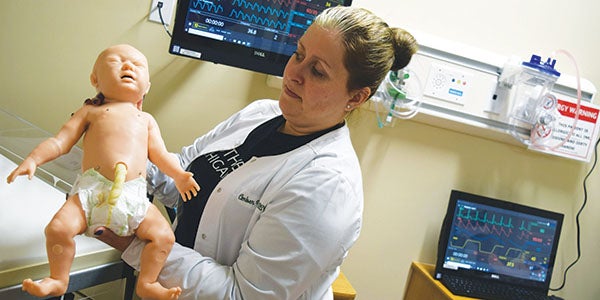Students attend SMC Nursing/Allied Health Day
Published 9:04 am Friday, November 8, 2019

- Students attending Southwestern Michigan College’s Nursing/Allied Health Day learned about the programs offered at the college. (Submitted photo)
DOWAGIAC — Southwestern Michigan College’s Nursing/Allied Health Day Nov. 1 showed the breadth of career opportunities offered in the $9.6 million facility opened in January.
Accredited programs include health information technology, medical assisting, phlebotomy (drawing blood), fire science, Emergency Medical Technician and nursing. The hospital-like, four-bed Karen K. Rose Simulation Lab enhances traditional clinical rotations with realistic robots.
About 80 high school students from Niles, Brandywine, Berrien Springs, Bloomingdale, Paw Paw, Mattawan, Gobles, Hartford, Bangor and Lawton attended.
A registered nurse for 15 years, Simulation Lab Coordinator Amber Villwock demonstrated manikins including Victoria, which gives birth; baby Super Tory (changes skin color to blue for cyanosis or yellow for jaundice); Pediatric HAL, 5, talks, cries real tears and urinates and can simulate seizures; adult HAL, spurts blood, and presents collapsed lungs; and Alex, which can converse with students about his pain level, medication, even Harry Potter and Disney movies.
Alex’s T-shirt maps where foundations students should listen with stethoscopes. A camera in Alex’s right eye helps students evaluate their form from a patient’s perspective.
A national expert on nursing education simulation, Dr. Pamela Jeffries, dean of George Washington University School of Nursing in Washington, has praised SMC for “getting it right.”
“You immerse them in a replicated clinical environment, so they actually, get to practice being an RN,” she said. “When learners go out to clinicals, they’re student nurses because of liability. Here, we watch them problem-solve, make decisions and see how they communicate with patients, families and each other.”
“SMC offers an associate degree program,” foundations instructor Stacey Dwyer explained. “After completing prerequisites in chemistry, math, anatomy, psychology and English and the two-year program, you take boards. Once you pass, you’re a Registered Nurse.
“We have 100-percent job placement,” she continued. “Most students have jobs before they graduate. Facilities where we do clinicals desire them because they see the caliber of students SMC develops. We have small class sizes and graduate nurses twice a year” in May and December, with 40 admitted per semester.
“This is one of two Skills Labs,” Dwyer said. “First-year foundations students spend seven weeks here, twice a week, six hours a day. Full head-to-toe physical assessments, vital signs, catheters, things like that. The next seven weeks we go out to a clinical site, like a hospital or long-term care.”
“Within three years, how many other associate degrees can get you positions that pay upwards of $60,000 a year?” Dwyer asked. “A lot of the health care companies will pay for your bachelor’s degrees. Online classes have been specifically developed for people working full time, so generally you take one class every two months. There are so many avenues of opportunities within nursing.”
Angie Mann, 1998 SMC nursing graduate, listened as a teacher of Niles High School’s Professional Health Career Academy and Allied Health course.
Mann worked as an RN for medical surgical/pediatric units, in the emergency department, received advanced training in medical forensics and testified in court as an expert witness. She started Lakeland Health’s Sexual Assault Nurse Examiner program.
“Nursing school is hard and different from anything you’ve ever been exposed to,” Dwyer said, “but it’s very doable if you surround yourself with a good support system. It takes a lot of self-discipline and time management. Our instructors focus on making sure you’re successful.”
Multiple-choice tests offer two correct responses. “You have to pick the best answer,” Dwyer said. “It’s not black-and-white, you deal with people and many variables. We develop students to be critical thinkers so they can take individual situations, make decisions and defend decisions they made. It’s more than learning facts.”
Julie Zabriskie comes from a nursing family, but teaches HIT on the Niles Campus to capitalize on her computer aptitude.
HIT professionals code, file, keep secure and share health-care information. While nurses are busy on the floor tending to patients’ physical needs, Registered Health Information Technicians behind the scenes take care of documentation, from insurance companies receiving correct data to covering legal issues so bills get paid.
Entry-level medical records and health information technicians can start at $40,350, but managers can command $99,730, with job growth of 25-30 percent forecast.
Shelley Todd teaches medical assistants, who administer tasks such as drawing blood, recording vital signs and explaining medications or office duties such as filing medical paperwork and scheduling appointments.
Coursework covers clinical, diagnostic and lab procedures; pharmacology; medical terminology; introduction to diseases; processing insurance claims; and office administration. Salaries start at about $34,000.
“One local hospital let me know they would take all of my students for internships,” Todd said, “because they currently have over 40 openings.”






